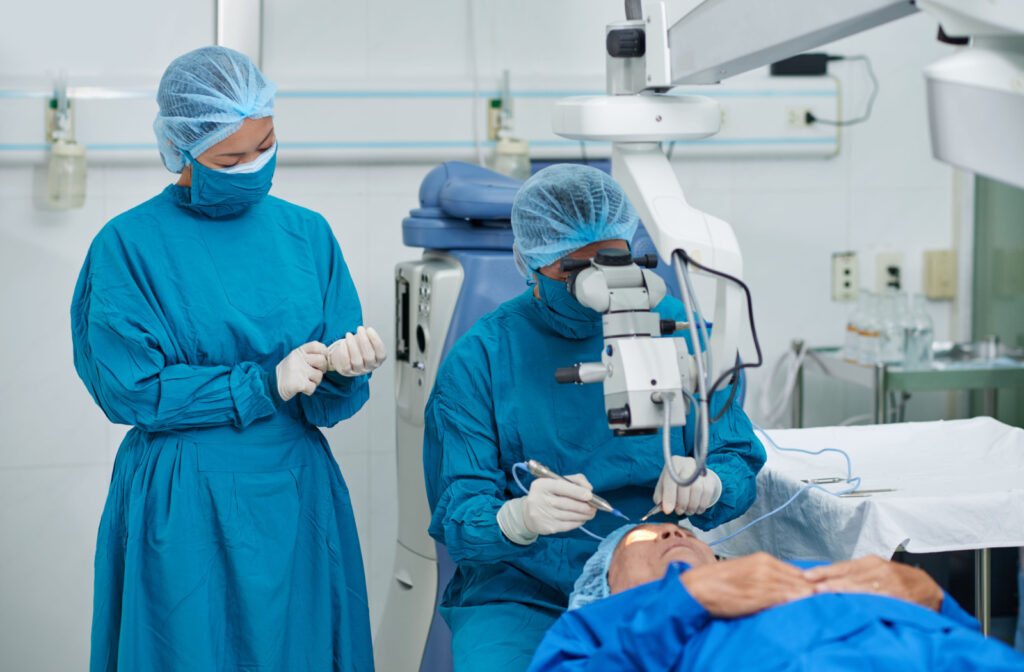Vision is one of our most critical senses, and when it starts to deteriorate, it can significantly impact your daily life. Cataracts are one such eye condition that can blur your vision and affect your overall quality of life.
Cataract surgery can help you regain your vision. However, as with any surgery, it comes with its share of risks and disadvantages, including infection, swelling, bleeding, visual disturbances, corneal edema, and in some rare cases, retinal detachment.
Cataract surgery is a common and safe surgery that has helped millions of people improve their vision. However, surgery is an individual decision, and you can discuss whether it’s right for you with your eye doctor.
Risks of Cataract Surgery
Cataract surgery is a common and low-risk procedure that has transformed the lives of millions by restoring clear vision. However, like any surgical intervention, it is not without its risks.
Infection Risk
Cataract surgery involves making an incision in the eye, which poses a risk of infection. While surgeons take great care to maintain a sterile environment, there is always a slight possibility of postoperative infection.
Swelling & Discomfort
After surgery, some patients may experience temporary discomfort or swelling. These are common side effects but can be bothersome for some.
Visual Disturbances
While the goal of cataract surgery is to improve vision, some patients may experience visual disturbances after surgery, such as glare or halos around lights. These symptoms are usually temporary but can affect daily activities during the initial recovery period.
Posterior Capsule Opacification (PCO)
PCO occurs when the lens capsule becomes cloudy after cataract surgery, leading to a gradual decline in vision. Although a laser procedure called YAG capsulotomy can easily address PCO, it is an additional intervention that some people may find inconvenient.
Retinal Detachment
While rare, retinal detachment is a serious complication that can occur after cataract surgery. It is essential for patients to be aware of the symptoms, such as sudden flashes of light or floaters, and seek prompt medical attention if they occur.
Intraocular Lens Complications
During cataract surgery, your natural lens is replaced with an artificial intraocular lens (IOL). The IOL comes with its own risks, such as incorrect power calculation, dislocation, or issues with the positioning of the lens.
Bleeding
Though uncommon, bleeding within the eye can occur during or after surgery, leading to potential vision issues.
Corneal Edema
Swelling of the cornea is a possible complication of cataract surgery that can affect your vision. It typically resolves with time, but you may experience blurred vision during the healing process.
The Pros & Cons of Cataract Surgery
Pros:
- Improved vision: Cataract surgery can significantly improve your vision, allowing you to see things more clearly.
- Enhanced quality of life: By restoring your vision, cataract surgery can help you regain independence and enjoy daily activities.
- Quick and safe procedure: Thanks to technological advances, cataract surgery is relatively quick and safe.
- Minimal discomfort: Most people experience minimal discomfort during and after the surgery, making the recovery process relatively smooth.
Cons:
- Potential risks: Like any surgical procedure, cataract surgery carries some risks, such as infection, bleeding, or retina detachment. However, these risks are relatively rare.
- Cost: Although Alberta Health covers certain expenses, there may be additional costs for premium lens implants, eye drops, and new glasses.
- Recovery time: While the surgery is quick, recovery may take some time. You’ll need to follow postoperative instructions, take it easy for a few weeks, and see your optometrist for follow-up appointments.
Healing Process
Healing after cataract surgery can vary from patient to patient. Some people might experience a speedy recovery, while others might face temporary blurry vision. Following postoperative care instructions, such as using prescribed eye drops and attending follow-up appointments, is crucial.
Discomfort and itching in the eyes are common after surgery, and you may need a protective shield to prevent rubbing your eyes. Your vision should stabilize within a few weeks after surgery.

Here are some tips for recovering after cataract surgery recovery:
- Restrict physical activity and heavy lifting
- Avoid rubbing your eyes
- Wear sunglasses in bright settings
- Wash your eyes carefully and avoid putting soap or water into them
- Avoid cosmetics and lotions around the eyes for at least a week
- Avoid irritants such as chemicals and dust
Clarity Beyond Cataracts: Navigating the Path to Vision Renewal
Cataract surgery is a standard and safe procedure. However, it’s essential to know the disadvantages and risks involved and weigh them against the benefits. We recommend discussing your options with your eye doctor at River Heights Eye Care to help you decide. Any surgical risks should be taken seriously. However, cataract surgery is an exceptional option to help restore your vision. Book a consultation today and determine if cataract surgery is right for you.


